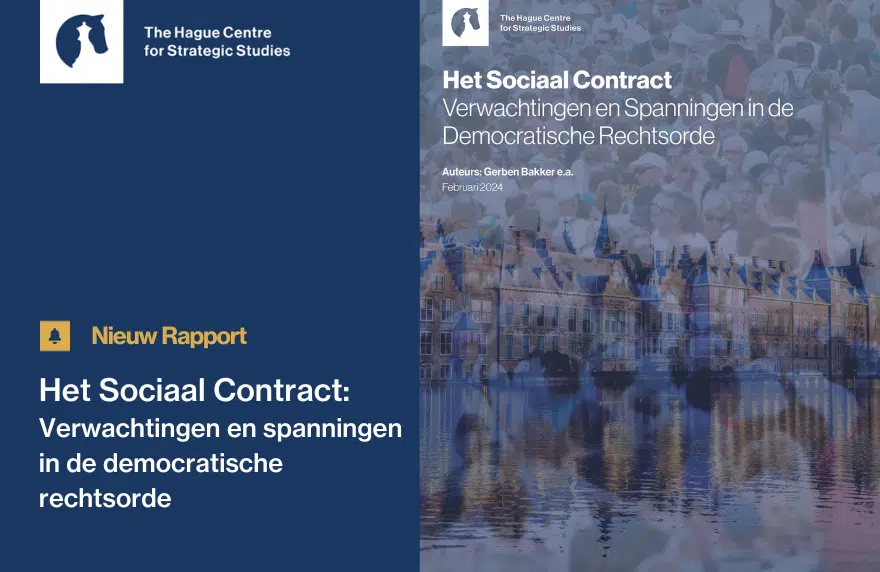Uit de wereldwijd grote aandacht voor Artificial Intelligence spreekt de verwachting dat AI de leefwereld grondig verandert en menselijke taken op allerlei gebieden zal overtroeven. Zal de toenemende integratie van kunstmatige intelligentie de Nederlandse samenleving de komende jaren daadwerkelijk op allerlei gebieden transformeren? Zo ja, welke vormen van druk zijn er dan te voorzien op de maatschappelijke stabiliteit? En hoe kunnen we daarmee omgaan?
Het beeld van een totale maatschappelijke transformatie is misschien wat overtrokken, maar deze nieuwe HCSS studie door Gerben Bakker, Sofia Romansky, Frank Bekkers, Bryan Smeets en Pieter Bindt laat zien dat AI de Nederlandse samenleving zowel in de breedte als in de diepte beïnvloedt. Dit gebeurt echter niet altijd op de manieren die vanuit de populaire verwachting naar voren komen.
De omvang van het krachtenveld rondom AI is zo groot, en de toepassingsontwikkelingen zo divers, dat het moeilijk voor te stellen is dat Nederland zelf veel regie kan claimen over de impact ervan. Vaak zal Nederland voor raad en daad moeten aansluiten bij Europa. Maar ook binnen de context van Europa heeft Nederland keuzes in hoe het zich oriënteert in relatie tot AI in onze samenleving en voor welke taken en rollen het AI (niet) wil inzetten.
Met het doel om ook strategisch te blijven in de focus van deze studie (en geen concrete beleidsvoorstellen te willen doen), is er een aantal strategische ‘trade-off-situaties’ waarbinnen Nederland keuzes kan maken. Deze ‘strategische balanceeracts’ zijn achtereenvolgens:
- Innovatie ‘versus’ waarden: het is lastig om ethische eisen op te werpen en waarden te willen dienen zonder daarmee ook het innovatieproces te frustreren of naar elders te verjagen.
- Buitenhouden ‘versus’ meebuigen: is het mogelijk om safeguards in te bouwen als je zelf niet aan de tekentafel zit? De EU heeft met de WAI een belangrijke dam gebouwd tegen risicovolle toepassingen. Maar hoe stevig is een dam tegen een systeemtechnologie die overal in lijkt te gaan doordringen?
- Defensief mensgericht ‘versus’ offensief mensgericht: Nederland volgt de Europese koers van de regulering van AI ter bescherming van mensgerichte waarden. Deze ethische insteek is goed maar moet niet uitmonden in een protectionistisch ‘leven achter digitale dijken’. Er is ook wat voor te zeggen om de potentie van AI op een proactieve manier te exploreren ten gunste van een mensgerichte, veilige samenleving.

Auteurs: Gerben Bakker, Sofia Romansky, Frank Bekkers, Bryan Smeets en Pieter Bindt.
Met medewerking van: Paul Sinning, Tim Sweijs, Bart Vossebelt, Anna Sophie den Ouden, Linde Arentze en Julia Döll.
Dit onderzoek is verricht door HCSS in opdracht van de Nederlandse politie, als onderdeel van het meerjarige programma Strategische Monitor Politie. Dit programma heeft tot doel een ‘van buiten naar binnen’ en toekomstgerichte blik op en duiding van relevante trends en ontwikkelingen te geven, om daarmee de strategievorming van de Nederlandse politie te ondersteunen. Deze studie is nadrukkelijk niet bedoeld als een alomvattende wetenschappelijke analyse, maar vormt een eerste verkenning waarmee het een basis biedt voor dialoog.
Het onderzoek voor dit rapport is afgerond in februari 2024. Gebeurtenissen of ontwikkelingen die plaatsvonden in de periode tussen afronding en publicatie zijn niet van invloed geweest op de bevindingen.
Cover image source: Canva












